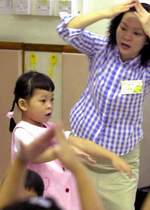 |
|
| Related Stories |
 |
 |
|
|
Interview: Basic Law ensures education autonomy in Hong Kong  |
|
|
 "The Basic Law clarifies the education framework in Hong Kong and our education system enjoys a high degree of autonomy," said Yeung Yiu-chung, president of the Hong Kong Federation of Education Workers.
"The Basic Law clarifies the education framework in Hong Kong and our education system enjoys a high degree of autonomy," said Yeung Yiu-chung, president of the Hong Kong Federation of Education Workers.
According to article 136 of the Basic Law, the government of the Hong Kong Special Administrative Region (SAR) can make up policies concerning the education development, including those on education system, teaching language and testing mechanism, said Yeung in a recent interview with Xinhua.
Yeung also serves as a Hong Kong deputy to the National People's Congress and chairman of the Panel on Education of the Legislative Council of the Hong Kong SAR.
He said the Hong Kong SAR government has been free to formulate education policies and introducing the education reform in the past five years since Hong Kong's return to the motherland in 1997.
Various schools, no matter which are run by the Catholic church or Buddhism temple, can continue to exist and enjoy the freedom of academic study, he said, adding that those schools are able to offer courses of religion education as they did in the past.

When asked to comment on the changes after the return, Yeung said education was tainted with colonialism before 1997, while it has become national education after that.
Terms and definitions with colonialism were left out in textbooks, national flags were hung on campus and students would sing the national anthem after the return, he said, noting that education focused on national recognition is quite different from that in the past.
After the return of Hong Kong to the motherland, the principle of "Hong Kong people governing Hong Kong" has been introduced. The education aimed to foster talents for the future, and therefore, the SAR government has been investing vigorously in education for years despite in times of economic difficulty.
The education fund is now much more than that before 1997, Yeung said, "The chief executive has attached great importance to education, and this very much helps boost the education reform."
Yeung, who is in his fifties, has been engaged in the education cause after graduating from the Chinese University of Hong Kong in1975. He has served as the principal of the Heung To Middle School since 1986 and has been contributing greatly to the education development in Hong Kong.

Yeung said the knowledge-based economy does not require students to recite, but to foster comprehensive capabilities of analysis and creation.
"We need education reform. Our education system has for long only emphasized on learning books and taking exams, and lacked the training of initiatives," he said. "We must introduce the reform to meet the demand of the knowledge-based economy."
The SAR government has put forward the concept of "lifetime learning" and expected 60 percent of people in the same age group to receive the tertiary education or above.
Moreover, the SAR government has launched various measures like tax exemption to encourage the "lifetime learning" in the community.
Hong Kong has the nine-year compulsory education, which makes sure that all the people under 15 years old are able to go to school. The government also offers low-interest loan to students to ensure that no students cannot go to school because of economic problems, Yeung said.

In the meantime, Hong Kong has launched more academic exchanges with the mainland and abroad after the return, Yeung said, adding that those exchanges can be described as with different levels, various channels and diversity.
For example, mainland students have come to study in Hong Kong; many schools in Hong Kong have forged twins relations with mainland counterparts and they hold exchange programs such as academic seminars and summer camps from time to time, he said.
On the other hand, Yeung said, Hong Kong has also maintained close ties with many education institutions abroad, such as the United States, Britain, Australia and Singapore.
The SAR government has set up the Quality Education Fund and all schools in Hong Kong are eligible to apply for it to do academic exchanges overseas.
The atmosphere of study gains increasing popularity in Hong Kong and many people go to schools that open part-time courses in the evening or at weekend, Yeung said, adding that he believes this trend will surely be good to Hong Kong's long-term development.
Editor:Inner Wu
Source:Xinhuanet
|
|
|
 |









